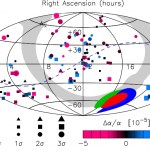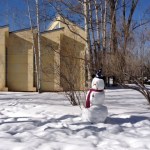Science
Philosophers are still grumbling about Lawrence Krauss, who openly dissed philosophy (word to the philosophers reading this: he recanted, so you can put down the thumbscrews and hot irons for now). This is one of those areas where I'm very much a middle-of-the-road person: I am not a philosopher, at least I'm definitely not as committed to the discipline as someone like Massimo Pigliucci, but I do think philosophy is an essential part of our intellectual toolkit — you can only dismiss it if you haven't thought much about it, i.e., aren't using philosophy at all.
So I'm pretty much in…
[View the story "Why does the science community shun the Bloggies?" on Storify]
Why does the science community shun the Bloggies?
I was shocked to discover that @bloggies is unaware of the reason that science blogs no longer participate in the contest. @bloggies noted: Prominent climate skeptic blogs tend to campaign for nominations, while other science blogs don't seem to mention the Bloggies.
Storified by Greg Laden· Tue, Feb 26 2013 10:47:37
@gregladen I don't know what the reason is myself.The Weblog Awards
.@Bloggies Maybe I'll write a blog post about it and send you the link if you…
Over in Twitter-land, Ben Lillie of the Story Collider asked an interesting question, which sparked some discussion that he's Storified on a Tumblr blog (just in case the date stamp wasn't enough to mark this as 2013...). The original question was:
Partly I’m wondering if there is a reason to have an event series for “other scientists,” but also wondering about the bigger question: is there something about being a scientist that makes it easier to understand other bits of science? I suspect the answer is “a bit,” but really want to know specifically what one could say to scientists they…
My students are also blogging here:
My undergrad encounters
Developmental Biology
Miles' Devo Blog
Tavis Grorud’s Blog for Developmental Biology
Thang’s Blog
Heidi’s blog for Developmental Biology
Chelsae blog
Stacy’s Strange World of Developmental Biology
Thoughts of Developmental Biology
Biology~
You know I teach the 8am courses every term, right? Every semester for years I get my oddball classes that weren't present in the curriculum 13 years ago (when I started here) stuffed into the cracks of the schedule. I'm slowly getting to be a little pushier and am gradually…
A couple of astrostatistics related announcements:
1) The Astrostatistics & Astroinformatics Portal is open.
"The ASAIP provides searchable abstracts to Recent Papers in the field, several discussion Forums, various resources for researchers, brief Articles by experts, and lists of Meetings. The site will be used for public outreach by four organizations: International Astrostatistics Association (IAA, to be affiliated with the International Statistical Institute), American Astronomical Society Working Group in Astroinformatics and Astrostatistics, International Astronomical Union…
"When I say, 'I love you,' it's not because I want you or because I can't have you. It has nothing to do with me. I love what you are, what you do, how you try. I've seen your kindness and your strength. I've seen the best and the worst of you. And I understand with perfect clarity exactly what you are." -Joss Whedon
I bet you love science; practically all of us do, whether we realize it or not. As children, we all live as scientists, born with no knowledge or experience of this world, but with inherent ability to learn and adapt.
Image credit: ©2005-2013 ~cchhrriissttaa, of deviantART…
We've got calls out to the local grad programs, and I've mentioned this on Twitter a couple of times, but it can't hurt anything to post it here as well: we've got a huge overabundance of first-year engineering students that is forcing us to open extra sections of our intro physics classes to accommodate them. The problem is, we don't have people to teach the new sections. Thus, we are looking for an adjunct to take one section of intro physics or introductory astronomy labs, starting in April and running through mid-June.
If you're within convenient distance of Schenectady, NY, and might be…
"We've learned from experience that the truth will come out. Other experimenters will repeat your experiment and find out whether you were wrong or right. Nature's phenomena will agree or they'll disagree with your theory. And, although you may gain some temporary fame and excitement, you will not gain a good reputation as a scientist if you haven't tried to be very careful in this kind of work." -Richard Feynman
Did you hear the news? A game-changing story about the Universe has just come out! Something is vastly, spectacularly different from the way we thought, and it will revolutionize the…
This past weekend, I was at Boskone, where I appeared on a few science-y panels. One of these was on the possibility of beaming power down from space:
Energy From Space
Beam me down some juice, Scotty? Let's talk about the possibilities -- and practicalities -- of really long-distance power transmission.
Tom Easton (M), Jordin T. Kare, Chad Orzel, Jeff Hecht, Joan Slonczewski
This was a little odd, as Jordin does this for a living-- he's been working on a proposal to NASA for a solar power generating satellite that would use lasers to beam power down to photovoltaic panels on the ground--…
Earth Impact Calculator
Ok, that was close, and I don't mean the zip by of li'l old 2012 DA14 this evening.
The Chelyabinsk meteor looks to have been on the high end of the range of quick and dirty estimates, with impact energy of maybe 300 kTon equivalent. This is a size impact we'd expect every few decades, maybe, quite a bit smaller than Tunguska, but larger than anything we know of in the last 20 years.
Meteors come in with speeds ranging from 10-70 km/sec.
This one appears to have had a speed of ~ 20 km/sec, which gives it kinetic energy of 2*108 J/kg
As you know, the handy unit here…
Nothing at all! I gave the students an exam instead! While I got a plane and left ice-bound Morris to fly to Fort Lauderdale, Florida! Bwahahahahahaha!
Sometimes it is so good to be the professor. And if ever you wonder why my students hate me with a seething hot anger, it's because I'm such an evil bastard.
Here's what they have to answer.
Developmental Biology Exam #1
This is a take-home exam. You are free and even encouraged to discuss these questions with your fellow students, but please write your answers independently -- I want to hear your voice in your essays. Also note that you are…
Yesterday's post about differences between intro physics and chemistry sparked an interesting discussion in comments that I didn't have time to participate in. Sigh. Anyway, a question that came up in there was why we have physicists teach intro physics courses that are primarily designed to serve other departments.
It's a good question, and in my more cynical moments, I sort of suspect it's because engineering faculty are canny enough to outsource the weeding-out of the students who can't hack it in engineering. But I think there are good reasons, particularly at a liberal arts school like…
A bolide hit the Earth over Russia, breaking up at low altitude, causing a strong shock that reached the ground causing damage.
There are reports of some fragments hitting the ground.
Good summary and videos at The Age
video from Russia Today
the fragments will be valuable and probably show up soon on ebay
there was no shootdown, the breakup is normal when the meteorite gets lower down into the atmosphere.
There are no issues with radiation [sic]
looks like a fairly slow shallow angle impact, detonating with kiloton++ energy below few km altitude - guessing from the video
that'd make it a…
Not long ago, I had a meeting with the Dean, who is a chemist. One of the things I talked about was my plan for distributing teaching assignments in the next few years, which ran into an interesting cultural difference. I explained how I was trying to make the distribution of assignments a little more regular and uniform, getting everybody to teach both intro and upper-level courses, and he said (paraphrased), "That's funny. We never have a problem with that in chemistry-- the organic chemists teach Orgo, and the rest of us teach general chemistry, and that's that."
It took me a minute to put…
The shadow of a shadow of a planet... and other fun Kepler discoveries
Exoplanets in Multi-body Systems in the Kepler Era is a conference currently under way at the Aspen Center for Physics
Physicists hard at work
The meeting is very vibrant, with a mostly very young crowd of active researchers.
There have been a number of very interesting talks reporting some very interesting discoveries, many of which are embargoed...
One, still unpublished discovery, from Josh Carter et al, for a KOI-not-to-be-named, used transit geometry from two planets and measurements of the stellar spin from…
I found myself writing about the social skills of scientists today for the book-in-progress (something I've done here before), and how they're portrayed in the media, so of course I had to drop in a reference to "The Big Bang Theory." Jim Parsons's portrayal of Sheldon Cooper pretty much nails down one of the extremes of the "socially inept scientist" axis, the borderline autistic genius who can't comprehend normal social interactions, but still won't shut up. The other extreme, of course, is occupied by Paul Dirac, who famously almost never spoke.
"The Big Bang Theory" is an endless source…
Image from: Collectors Weekly
Ever wonder how to tell if "scientific" information that you find on the internet is believable or just plain bogus? I came across a website called Sense About Science that explains how research is published and how to determine if it is credible. They also give advice and answer questions about claimed scientific evidence.
Here is a synopsis of the scientific peer review process: After a study is conducted and data has been gathered and analyzed, scientists summarize their findings in a paper that they submit for publication to a journal…
Last Friday, when I didn't have any time to blog, Zen Faulkes wrote an interesting wrap-up post on Science Online 2013 in which he declared he won't be back. Not because it was a bad time, but because other people would benefit from it more, and his not going frees up a spot for somebody else.
I recognize a lot of his reaction, though there were a couple of things that I got out of it that I think made it worthwhile, beyond just the socialization. On the whole, though, it wasn't really a transformative experience for me. I like to think, though, that I was able to provide a few things that…
Epigenetics. You keep using that word. I do not think it means what you think it means.
I realize I overuse that little joke, but I can't help but think that virtually every time I see advocates of so-called "complementary and alternative medicine" (CAM) or, as it's known more commonly now, "integrative medicine" discussing epigenetics. All you have to do to view mass quantities of misinterpretation of the science of epigenetics is to type the word into the "search" box of a website like Mercola.com or NaturalNews.com, and you'll be treated to large numbers of articles touting the latest…
I ran across this recently while looking for something else, and was reminded of it by this discussion of jargon. It's an attempt to explain the general historical context of the whole Higgs Boson thing, and why it's important. I improvised this in response to somebody's question about how I would explain that, drawing mostly on my recollection of a couple of history-of-field-theory books. I kept it in case I needed to bust it out when they discovered the Higgs, but that fell during the time when I wasn't able to blog, so I never used it. I'm never going to use it for anything else, though,…





